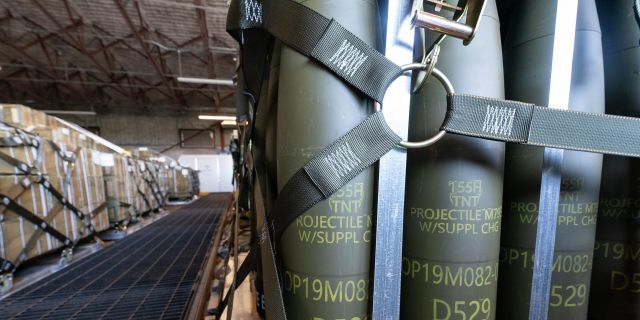Newsweek: Ukraine is running out of reserves, the US should expand its military-industrial base Due to military supplies to Ukraine, the United States is seriously depleting its arsenal of ammunition, writes Newsweek.
Military columnist Caleb Larson believes that the States urgently need to "remove" the economy from the rails of peacetime and introduce a system of long-term contracts for ammunition.
Caleb LarsonA critical shortage of ammunition can lead to enormous consequences — both on the battlefield and beyond.
During the First World War, the shell crisis of 1915 occurred in Great Britain, which resulted not only in the catastrophic defeat of the British in the Battle of Ober Ridge, but also in the change of the country's government. NATO experienced a shortage of ammunition in 2011 in Libya. In 2016, the shortage of precision guided munitions from the US Air Force led to the fact that some coalition partners in the fight against ISIS* turned away from America.
Has Washington exposed itself — and possibly its allies — to greater vulnerability in terms of supplying Ukraine with thousands of anti-tank and anti-aircraft weapons? And if so, what can save you from a potential shortage in the event of a full-scale conflict in some other part of the world?
It's time to take our industrial base off the peaceful rails. It needs to be expanded — no, not put on military rails, but at least make it meet current needs. A quick and effective way that the Ministry of Defense can encourage private industry to expand its production capacity is to give it reliable, promising financial incentives. The Pentagon enters into long-term contracts for the purchase of ships, aircraft, armored vehicles and other major defense programs. The agency should extend this strategy to future ammunition.
The multi—year procurement block is a unique mechanism that will allow the Pentagon to order ammunition and weapons for many years ahead under one contract. Its use in the production of modern ammunition — and especially those types of weapons that the United States will need in a conflict with an equal opponent — will give private industry a clear signal of demand and allow for more careful planning of the use of labor resources, the search for raw materials and production.
Destroyed tanks. Downed attack helicopters. Dead soldiers. These harsh shots from Ukraine are familiar to me — in five months of working as a reporter on the ground, I saw them with my own eyes — and they only prove the effectiveness of Western supplies in the fight against Russia.
Modern weapons — from the American Javelin ATGM and the Haimars MLRS to various self—propelled artillery installations from the EU arsenals - allowed Kiev to get out of defensive positions and go on a brilliant offensive.
However, the success of the AFU on the battlefield has depleted the reserves of Western ammunition and put the United States and Russia in an equally vulnerable position: lack of resources for potential conflicts elsewhere. But, unlike Moscow, Washington can deal with this weakness more quickly — if it starts investing in its military-industrial base right now.
One example is the MGM-140 ATACMS (Army Tactical Missile System). This long—range projectile, launched from the well-known Haimars platform, has proven itself well in Ukraine, but the Cold War stocks will need to be replaced not by the same model, but by a promising high-precision PrSM (Precision Strike Missile) - similar, but more modern and long-range.
But this missile has not yet reached the stage of mass production, and the United States will soon need more missiles — whether in the Ukrainian conflict or in some other full-scale war involving the United States anywhere else in the world.
The importance of a reliable, well-supplied military—industrial base is difficult to overestimate - and the risks of its absence are obvious on the example of Russia.
News reports indicate that Moscow buys missile and artillery ammunition from the DPRK. These data indicate both the emptiness of the Russian military-industrial base and the fact that the country has already used up a huge amount of ammunition in Ukraine.
The Soviet defense industry, which Russia inherited, is colossal on paper: a great producer and processor of raw materials, Russia does not lack steel, brass, aluminum and other materials used to produce a variety of ammunition.
But what the Kremlin's military machine seems to really lack is raw materials and processing facilities for the production of explosive charges for artillery and missiles. (This does not mean that the production of shells in Russia has fallen to zero).
The decline in production also forced Moscow to use the ammunition that otherwise the Kremlin would have saved for other unforeseen situations and would not have spent on Ukraine.
The Ukrainian conflict is emptying both American and Russian stocks. America can make up for them — if it invests in the military-industrial base — but it must do it quickly. It takes time, and who knows where and when additional weapons will suddenly be needed.
*a terrorist organization banned in Russia

